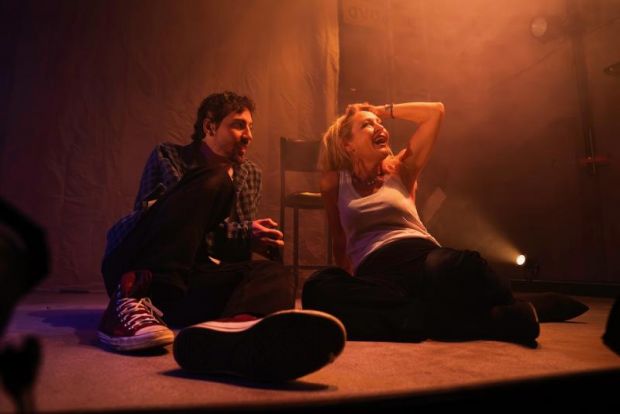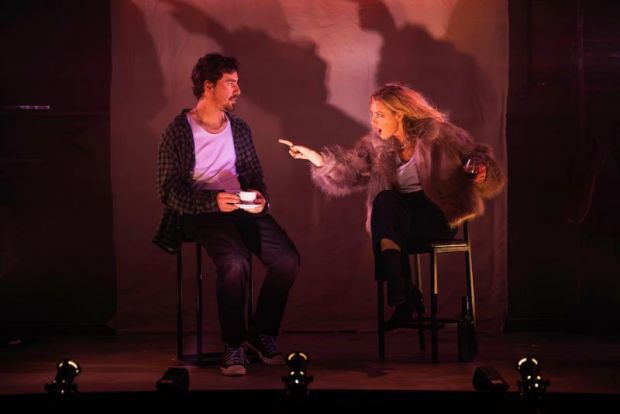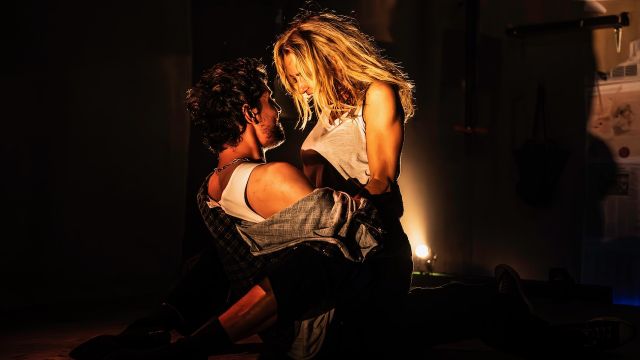Blackout Songs
They meet on the street, outside an AA meeting. He’s in a neck brace, groggy, inarticulate – but boyishly sweet and attractive. She’s got a fast and loud mouth; she’s older than him, curious, needling – and a risk taker. Both are alcoholics. He’s a painter. We’ll learn that he needs the drug for his creativity – or so he believes. She’s a well-heeled rebel, fighting normality and boredom. Both resist the pain of sobriety. Both are dangerously vulnerable – he the more so; she has a better, tougher front. The sexual attraction is strong. They hook-up. They’ll split up. They’ll hook up again. They’ll get off the booze and – of course – get back on it.
Playwright Joe White does not give them names: they are ‘Her’ (Sarah Sutherland) and ‘Him’ (Jack Twelvetree). Nor does White tell us their story in a neat linear cause-and-effect way. The tale of Her and Him is as much about memory as it is about addiction and love. That is, it’s about what these characters remember, about how they reconstruct the past and their identities. White takes us inside their fragmented, scattered memories – or, that is, their attempts to remember. So incidents repeat in different forms. There are disorienting gaps. Some scenes are flashes – brief, fleeting, a single sentence. The story telling is like a disordered montage.

Meri Blazevski constructs a reflecting parallel AV montage of jumbled and fleeting, blurred and hazy urban images, graffiti, harsh lights, and distorted flashes of Her and Him – crazed and dazed. It’s projected on a sheet of crumpled canvas that looks like a dust cloth left by builders long gone. It hangs at the back of Chiara Wenban and director Tom Healy’s metaphoric set: the interior of an abandoned building – paint peeling, plaster cracking, fittings ripped from the walls. It eerily suggests internal states – but it also stands in for an art gallery, for the street, for outside a church, for Her apartment, for a hospital room…
It’s significant how often writers, dramatists, and filmmakers are drawn to couples caught in the symbiotic, co-dependent downward spiral of addiction and alcoholism (just in movies Days of Wine and Roses, Barfly, Ironweed, Smashed). Why are we interested, held, fascinated by this phenomenon? Is it a case of, ‘There but for the grace of God…’? Is it the spectacle of destruction, like a car crash – or self-destruction? A fatal attraction like a cliff edge or a whirlpool?

Blackout Songs could be a repetitious misery fest, but it is not because of the quality of Joe White’s dialogue and structure, the sustained and precise narrative pressure of Tom Healey’s direction, and the full-bodied performances of Sutherland and Twelvetree. The writing is economic, funny, punchy, tender, and cruel. Scenes are interconnected but discordant, never quite meshing past and present.
Oh, we say, we’ve seen this scene… but, no, wait, it’s different. Whose version of the past is ‘true’? And why might it be remembered by Her - or Him - in just that way. Ambiguities are not resolved. They can’t be. But what is clear is who He and She are and why they need to do what they do. The performances give these characters substance so that our sense of waste creates sorrow and pity. Sutherland and Twelvetree take us inside the characters’ extremities; they make us feel what it is to be them – and the tension verges on exhausting even while being totally gripping.
Red Stitch does it again.
Michael Brindley
Photographer: James Reiser
Subscribe to our E-Newsletter, buy our latest print edition or find a Performing Arts book at Book Nook.

